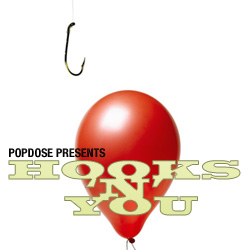
Now, where were we?
Oh, that’s right: we were chatting with the one and only Francis Reader, frontman for the Trashcan Sinatras. If you tuned in last week (and you really should have, you know), then you’re already aware that the conversation between Frank and myself was one that was a little freewheeling in its form, but the end result seems to be well appreciated by fans of the band…and, indeed, by members of the band. Our own David Medsker spoke with Paul Livingston a few days later – look for that interview on Bullz-Eye.com in the very near future – and remarked that I really seemed to have caught Mr. Reader in a talkative mood. Well, all I can tell you is that the decision to make it less of an interview and more of a conversation seems to have worked in my favor, and I’m glad that it seems to be going over well. Now, mind you, I did hear from one friend of mine who, after praising the piece, noted that it perhaps wasn’t the kind of interview that the band’s manager would want, given that there was zero mention of the band’s latest album, In the Music.
What luck, then, that there’s quite a bit of chat about the record in the second and final part of our conversation.
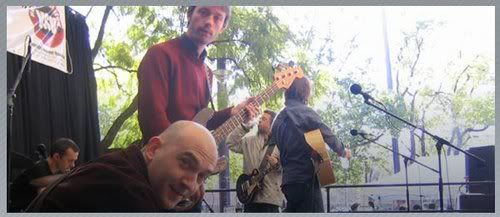
Popdose: So what’s Davy Hughes’ status with the band? Did he drop out? Did he just not want to participate anymore?
Frank Reader: Well, Davy’s still involved, but he’s…you know, he’s got a family, and it’s just not the kind of thing, really, where you can give your all your time to it when you’ve got a family and kids to support. Neither me or Paul or Steven or John have got kids, and although three of us are married, John’s married to another musician, and me and Paul are married to very understanding, beautiful women. (Laughs) For Davy, it was just a case where we had to work out a different way of having him involved, and that was…what we kind of do now is that we keep in touch, obviously, and every now and again, he’ll say, “You know, I managed to get ten minutes’ peace from the kids…” (Laughs) “…and I sat down and did a bit of writing, and here it is. If there’s anything you can do with it, do something with it.” So he contributed to In the Music in that way. And it’s great, because it feels good to have him involved, because he’s a touchstone in my life. He was there in the very beginning, although he didn’t play on Cake. He was actually playing with us once or twice before we made an album – when we were just doing covers, he was around then – so it’s good to have involved. It’s kind of “once a Trashcan, always a Trashcan” with him, you know? (Laughs) And the keyboard player we have, Stevie, has been with us off and on since ’95, so he’s more permanent now, too.
With In the Music, I have to ask: how did Carly Simon come to appear on “Should I Pray?“
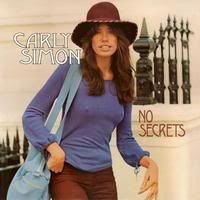
Well, we recorded part of it in Martha’s Vineyard at Andy Chase’s, and he was virtually a next-door neighbor of hers, so he knows her and her friends. I think that’s right. I’m trying to remember the relationships and the way the jigsaw goes together. He invited a couple of her friends over, and she wasn’t around, but we’d obviously said, “Can Carly come to the house?” And he said that she was out of town but that he was going to invite a couple of her friends. And we said, “Well, that’s close enough. We can talk to them about Carly Simon!” (Laughs) But we got on well with her friends, and they promised to give her a CD, so we gave her a couple of songs and a couple of ideas, and we wrote her a note with it, just basically saying how much we admired her, especially the No Secrets album. That was one of John’s favorites. And I think “You’re So Vain” was the first song I ever remember hearing, actually, so I waxed a little bit about that. It was all stuff that I’m sure she’s heard before, but much to our surprise, she got in touch with Andy after we left and she said that she loved one of the songs and asked if she could try doing a backing vocal on it. She was very gracious about it and very not at all pushy. She was very…I got the feeling that wasn’t completely sure of herself, which is a trait I always like in people. So she did some tracks, some recording with Andy over one of the songs. We never actually met, though. We were obviously just totally thrilled to have her involved. It’s a great, great honor to have her do something like that.
I understand that “Oranges and Apples” was inspired by Syd Barrett. Even without listening to the song, that certainly makes sense to me, given that I’m familiar with his early Pink Floyd single, “Apples and Oranges.”
Oh, you know “Apples and Oranges”?
Absolutely. I’m a big Barrett fan.
Oh, cool! Well, what had happened is that…well, he had died, obviously… (Laughs) …and we had been reading all about it, and there were all of the articles and the tributes, but a lot of them had been focusing on how he was an acid casualty, and…you probably know Boo Hewerdine, right?
Sure, from The Bible.
Yeah, and he plays a lot with my sister and John as well. Well, Boo’s a Cambridge man, and he was telling John that he often saw Syd around, and he always thought that Syd looked really happy. In fact, Boo actually helped him when he fell off his bike in front of him. Syd fell off his bike, and Boo helped him back on. And John started thinking about it in terms of how people like to focus on the idea of Syd Barrett and that he was a casualty because of that period of his life in the late ’60s, but you can have another perspective on his life if you read the stories from people who knew him. His sister, particularly. He was quite at peace and he was enjoying himself, and he was very, very creative still, just in a different, non-pop way. John, who’s the main writer of that song, his idea was to try and kind of write something focusing on that side of him, you know? Focusing on the positive side of actually being Syd Barrett and living your life day to day. And I think sometimes that, when people die like that, the whole story sort of falls into place in your mind. It’s no longer an open-ended story, so you can reflect on it then. It’s a lot like what people are doing right now with Michael Jackson.
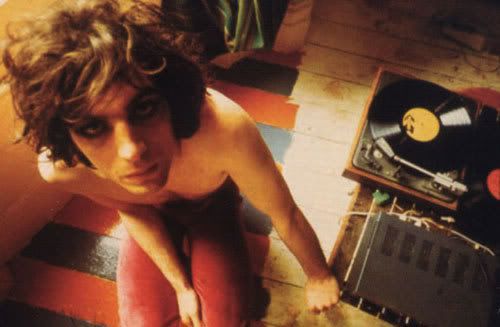
We’ve always been fans of Syd, and I think that came out in the end. We knew exactly what John was talking about when he brought it in, and we had great fun getting that kind of soundscape together. We just played for hours and hours and hours, going around all of those chords, stoned out of our heads, but putting it all together…it all came together rather magically. And then the City Wakes people in Cambridge were organizing a two-week festival in tribute to Syd, with art, photography, films, and, of course, music, and we asked them if we could donate the song to the Mental Health Trust as a single, because we’d already mixed it by that point. And the proceeds, as much or as meager as they may have been, it still felt good to be involved with it. And Storm Thorgerson, he did the sleeve for it, too. So it was just a great…well, it was like the Carly Simon thing: it was great for us. We were so pleased. You open one door, and you don’t really know where it’s going to lead you, and the next thing you know, you’ve got the guy who did the Dark Side of the Moon sleeve doing your sleeve. (Laughs) And we’ll always have that! It’s the little things in life that keep you going.
Absolutely.
So it’s just been great, you know? The whole album’s been a great experience, as far as all that’s gone. It was lovely to be able to pay tribute to someone like Syd like that. We’ve always been more Syd than Roger, ourselves, and understood about the fragility of people like that. We kind of feel an empathy to him more than we do… (Starts singing) “Money!” (Laughs) All that stuff with public schoolboys whining about money. But we love Floyd.
My introduction to Syd Barrett was all hosed up. I discovered Robyn Hitchcock first, then through him I found Syd Barrett…and, then, my first Barrett album wasn’t even a proper album. It was Opel.
Oh, right, which was…was that the last one he made?
It was kind of an odds-and-sods collection.
Right. Yeah, right around 1991, we had Pete Jenner as a manager for about a year, and, of course, he was Syd’s manager while he was the Floyd’s manager. And when the band split and Syd was forced out, he obviously thought, “Well, Syd’s the guy to go with!” And he managed him all through The Madcap Laughs and right up to the point where he left and gave up making music. He was an interesting person to talk to about that, because he was so old-school business. He was still very much in the Allen Klein kind of vibe…but without the violence, probably. He was very much, like, “Just get it done! Get in the studio, and a few years later, you should have a hit single.” And we were, like, “Yeah, but it takes us six months to write one song, and even then we’ll want to start again!” So it was a bit of a mismatch, but it was interesting to get close to someone like that, who managed in that way and who knew someone so luminous in our lives. He was Billy Bragg’s manager at the time, and I think he managed Eddi, too. But after us, actually, I think. We had a bit of a connection there, too. I haven’t heard much Robyn Hitchcock, actually. I always think I’ll get round to kind of listening to some Robyn Hitchcock, but other than what I’ve heard in passing, I don’t know his stuff at all.
I should make you a Best of Robyn Hitchcock disc.
Yeah! I’d really like to hear some of that stuff.
Really? Hey, if you want one, I’ll make you one. I mean, I literally have all of his albums, so it wouldn’t be hard to put one together.
Yeah, whatever you think is the best. That’d be cool!
Okay, you asked for it!
Well, I like all of those gentle Englishmen. (Laughs)
I’ve done a couple of interviews with him, and he’s a really nice guy, always very interesting to talk with.
Yeah, he’s one of those guys who I’ve heard talk more than I’ve actually heard his music, but he’s always more than just a talking head. His perspective always seems to be a bit above the cliche and the rabble. I think we had some friends in common at one point. Tim Keegan was playing with him for awhile, wasn’t he?
He was.
We’ve had a lot of friends like that. The Blue Aeroplanes, he played with them.
Oh, sure, I remember them. Particularly “Jacket Hangs.”
Yeah, “Jacket Hangs,” and “…And Stones” was a cracker of a song. We would meet a lot of these bands on tour, you know. I remember Gerard from the Blue Aeroplanes being a sweet, sweet guy, taking us for a walk around historic Bristol after the gig. You don’t always want to just sit down and have a few beers after a show, and he said, “Come on, I’ll show you some architecture.” (Laughs) Okay, fair enough! So, yeah, lovely people.
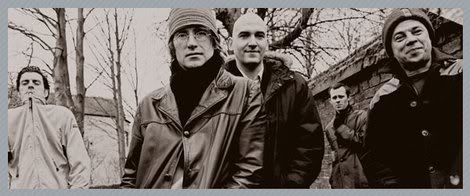
Well, I’ve only got a couple more for you, because I’ve already talked your ear off…and vice versa! (Laughs) But I was wondering how you came to hook up with Andy Chase in the first place. I know he helped to mix Weightlifting, but how did that come about?
He came through our Japanese publisher. He’d worked with, I think, Tahiti 80, it was. You know that mob? They’re French. And we had heard his production…not his music, but his production. I think he was just getting started in production roundabout when we first heard his name, in ’98 or something. So our publishers in Japan had wanted us to consult with the guy from Tahiti 80, because they’re always trying to push you into doing, like, songwriting. We have enough trouble getting ourselves together! But the name “Andy” stuck around, and when Weightlifting was being made, which was our first album in eight years, we sat down in front of the mixing desk, and we were, like, “We don’t actually know what the hell we’re doing here! We haven’t the faintest idea how to mix a record!” I mean, it takes practice. You have to keep your hand in, and we hadn’t done it. So we sent him a tape of a couple of songs, ’cause we knew that he was interested and really wanted to do it, and that that he liked the band a lot. So we asked him to mix a track for free. And he’s a canny soul, so it took a bit of persuading, but he did it, and he sent us a copy of a song, “All the Dark Horses.” No, he did two. He also did “Leave Me Alone.” So he sent them to us, and we just thought they sounded terrible. We were actually kind of smug about it, how we were right not to have that guy. “We’ve made the right decision!” (Laughs) We were kind of happy about it! And then we went back to try and mix it, and we had gotten an engineer friend, but we ended up somewhat mixing it ourselves…just kind of pushing faders up randomly, basically. And then we thought we had a great, great mix of “All the Dark Horses.” But just on a whim, Paul and I, after listening to our mix and seeing how great it was, we put on Andy’s…and it just blew ours out of the water. It was, like, “Fuck, we’d better phone that guy back!” So we phoned him back, and we were saying, “Look, we’re really sorry about that. I don’t know what we were thinking, but we really love the mixes now, actually.” It just sort of came to us what was there and what he was doing. It’s very strange and hard to explain how you can hear the same thing in one environment and it doesn’t sound the same as in another, or at another time of the day or in another headspace. But he was very gracious about that, and he kind of said, “Ah, I thought you’d be back with your tail between your legs!” (Laughs) So we got involved, and he was always a saint when we went over to do the mixing in New York, John, Paul, and I. He’d often say, “I wish I could’ve had this record from the start. I really want to try and make a record with you guys.” And when we got In the Music together, we had a short list of producers…and my choice was Barry Gibb. And I wasn’t even high! I really wanted Barry Gibb to do it! (Laughs) I don’t know why I came up with that idea. Maybe it’s one for the next album.
Hey, I’m behind you. I’m a big Bee Gees fan.
Yeah, so you know what I mean, then! I just love the man. He’s one of my all-time heroes, and he’s very underrated as an arranger and producer, I think, though not by me, and I’m sure not by you, either. But Andy Chase was really glad to be involved, and he has a studio in New York, of course, so we were all up for the adventure of trying it. So we had some songs, and we did a little back-and-forth with E-mail and MP3s and demos, and he helped us along, and after about six months of that, we thought we were ready to all go over. And that was a big leap for us to do that, to gather all the money we’d got and take six people over to New York. That’s not an easy or cheap thing to do. But, thankfully, we got there and the set-up was fantastic. Andy and his really amazing engineer, Rudyard, had a great sound going from the start. Andy was a little cautious. I think he’s a bit…well, it’s like I was saying about building records up a bit studio-precise, and the records that you make from scratch are like that. He uses quite a bit of machinery. It’s well-managed and I think for the most part that he keeps it in mind that if he wants to retain the soul of something, but he still uses a lot more machinery than, for instance, a band like us would use.
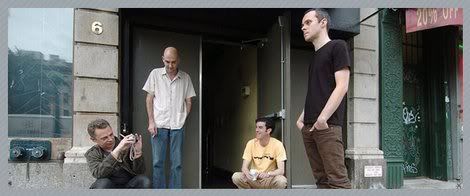
But he was a bit wary of our ideas because, by this point, we had been rehearsing a lot in Glasgow, and I had kind of conceptualized the album as being one that we would do completely live, maybe apart from the singing. Again, I think he kind of nodded his head and said, “Yeah, right, we’ll see.” But we went in and we did the music, and we took an extra guitarist with us, a friend of ours from Kilmarnock, so we could try and do it all live. And the very first night, we did In the Music, and it just sounded like a record. It was, like, “Wow, this is fantastic!” And we did that for about one and a half weeks, got all the tracks down, and for the rest of the time, we played internet poker, did a few overdubs, and watched him on the computer, chopping up files. I don’t know what he was doing, but, basically, it was done in a week and a half.
Wow.
It was great! It was a wonderful, wonderful experience. It was the way we had to make this record, and he was surprised that the sound was so good straight away. That won him over to the idea of us doing it live. We’d been able to capture it. We’ve got those twenty years of experience, you know, so it’s something that we should use to our advantage! It was something we had to do, though, because there was the element of sense in the band that we couldn’t really make an album like Weightlifting again. We couldn’t, like, “Right, that’s the drums down, let’s get the bass down, and, Paul, let’s get a guitar sound together.” It wasn’t really interesting to us anymore to do it like that. The excitement of sitting in the chair next to the producer had kind of worn off. Now, the excitement was sitting in the room and making the big, soupy noise and just getting lost in it. That was the excitement for us. There are plenty of 16-year-old guys in bands who start off making music like that, but our time and our experience was different. Our time and experience was a more separate recording fashion, and it took us a long time to come around to the best way of doing stuff. (Pauses) Excuse me, Will, it’s my wife. She’s just come in. (Leans away from the phone for a moment to address his wife and make sure she’s well, then explains to her that he’s just doing an interview and will be finished momentarily) So, yeah, Andy was a great facilitator for that, and very organized as well.
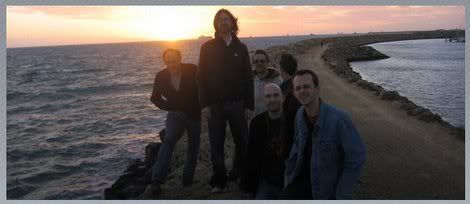
Well, I’ll officially start the wrapping-up process, but…are there any songs that fans should not expect to hear during the upcoming tour?
That depends on the fan, I think. (Laughs) You know, when we were making this record, I was thinking, “You know, I could see a lot of Trashcan fans not really being into this kind of thing,” and it’s been borne out, but there’s not really anything we can do about that. The Cake stuff really isn’t…we have to feel it. Sometime maybe some of those songs will talk to us again, but at the moment, a lot of them don’t, and we’re really only interested in playing songs that excite us and interest us, so I would say that if you went along thinking that you were going to hear “Who’s He,” you would probably be disappointed. And that would go all of the first album, probably. I don’t know, it’s just that…I’m over 40 now. I’m 43, and some of that stuff was done when I was 22. And it’s not just me. There are five people in the band, and I think Paul would’ve gladly stopped doing Cake stuff in, like, 1992 or something. (Laughs) He’s been a trouper, I’ll have to say that for him. He’s been a real trouper about that. But I’ve noticed that a lot of people who haven’t really responded to this record very well have been the kind of people that like the kind of Trashcan music that *I* don’t like anymore or that I’ve never really felt comfortable with. When you’ve got three or four songwriters in the band and you’re working in a collective way, that’s always going to be that way. There’s always going to be a little bit of where you’re doing things for your friends sometimes. Like, “Okay, John really believes in this, and I love John, so I’m going to give it my all,” you know? And vice versa them for us. But that doesn’t mean that, on a Wednesday night in Manchester, you feel like getting out there and doing it. And with one or two of our songs, it’s been like that, and those have been the ones that have kind of died away, but we’ve got a catalog of about a hundred songs that were recorded, and we’re really, really proud of all of them for what they are, but most of them we’re still keen on, which is nice. And, again, our collective songwriting team is what’s really helped us stay interested. I think very few bands with single songwriters last more than a couple of albums and do anything of any real interest. If you think about it, all of the big bands who’ve managed to sustain themselves for more than ten years and are still making great records…you throw in your U2, R.E.M., the Beatles, even…have at least two songwriters, sometimes three. The only bands that have sustained on the basis of one songwriter that I can think of are the Kinks and the Who. Maybe you can think of more. But I think it’s helped, because…oh, Radiohead, there’s another example. There’s too much for one person to take on. It’ll burn you out! (Laughs) That’s why bands like Coldplay make one great, great record, and the rest of them are, like, “Well, so what?”
Well, that’ll do it for me, then, Frank.
That’s actually good, because I have to go! (Laughs) We’re just dashing off. But it was nice speaking to you, and let us know if you’re at one of the shows!




Comments